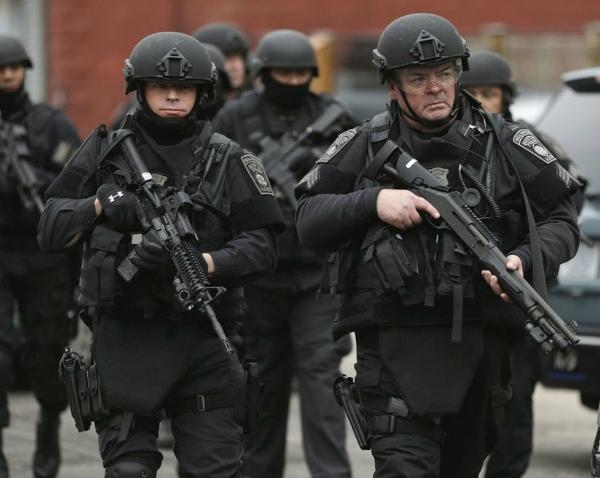
There is an identity crisis among America’s police officers.[ref]Cynthia A. Brown, “Divided Loyalties: Ethical Challenges for America’s Law Enforcement in Post 9/11 America,” Case Western Reserve Journal of International Law, 2011.[/ref] Particularly in our urban centers, the motto, “Protect and Serve,” is becoming obscured through an apparent fog of war. Whether it is due to the “War on Drugs” (waged in 1986 by President Reagan, with just 2 percent of voters at that time identifying drugs as a main issue of concern)[ref]Michelle Alexander, The New Jim Crow: Mass Incarceration in the Age of Colorblindness, New Press, 2010.[/ref] or the “War on Terror” (waged in response to 9/11, after which President George W. Bush declared, “every American is a soldier, and every citizen is in this fight.”),[ref]Brown, 2011.[/ref] the militarized weapons and tactics of police in the United States has increased exponentially. The racial biases implicit in the implementation of these federal initiatives have been well documented, but not as much attention has been paid to the militarized, “us vs. them” culture fostered among law enforcement departments resultant from elected officials declaring war on the citizens whom they supposedly represent.
“The qualities of a great police officer are virtually identical to those of a great soldier… A career in law-enforcement may appeal to those with military service due to its similarities with military structure and practices,” reads a military.com article, “Five Hot Jobs For Ex-Military Personnel.” While ex-military personnel can certainly provide valuable skills to police departments, the nature of warfare and foreign occupation is significantly different from that of domestic law enforcement, and therein lies the vendetta. As criminologist Ralph Mroz lays out in his work, Militarization of Civilian LE?, “Military rules of engagement allow for the (accidental) killing of non-combatants, and have a restricted concept of ‘rights’ for civilian populations,” while “law enforcement rules of engagement are strictly constrained by the constitutional rights of everyone involved—including the perpetrator, and they place paramount importance on saving lives…”[ref]Ibid.[/ref] The trouble with law enforcement officers adopting a military mentality in which the public is seen as the enemy—particularly the African American public, as evidenced by the statistics—is clear. Law enforcement in the United States began in the mid-19th Century as a highly decentralized concept, but over the years—and especially from WWI through the Cold War—as the United States transformed into a military superpower, the perceived need to defend itself from internal threats to democracy served to justify the professionalization and militarization of police forces.[ref]Ibid.[/ref]
The proliferation of guns throughout the U.S. is indeed an enormous issue, and our country’s weak gun control laws do require a different approach to law enforcement than in nations with tight gun control policies. However, de-escalation should always be the number one priority when officers approach a potentially violent situation, but when NYPD commissioners Bernard Kerik and Howard Safir use the phrase “hunter of men” to describe police work, their motives are rightly called into question.[ref] Radley Balko, “What Cop T-Shirts Tell Us About Police Culture,” Huffington Post, Jun. 21, 2013.[/ref] And when a popular t-shirt circulating the NYPD ranks cites Hemingway’s ominous words, “There is no hunting like the hunting of man, and those who have hunted armed men long enough and liked it, never care for anything else thereafter,” the disconnect between police forces and the communities they serve becomes painfully apparent.[ref]Ibid.[/ref] Other popular police t-shirts created by other large urban police departments around the country are equally disturbing and far more racially charged. One must not, however, take this to mean that all police officers harbor such disconcerting, frightening sentiments. Rather, institutional arrangements like police quotas, the issuance of military equipment as reward for high arrest numbers, racial profiling, and the prioritizing of drug law enforcement as a national security issue lead to the stark disconnect between the police and their constituents. Law enforcement officers across the U.S. have adopted a fraternal bond which, while of vital importance overseas in enemy territory, fails to recognize the rights of every United States citizen and simultaneously distances the citizen as ‘the other.’
How do we address this problem? The mutual demonizing occurring between communities and their police ranks, the transference of military equipment to departments across the country, and the insistence of politicians to wage domestic “wars” on the public all contribute to the militarization of police culture. Community policing initiatives, through which police officers leave their cruisers to personally engage the members of the communities they serve, are a common prescription. Unfortunately, many officers view such approaches skeptically, referring to them as “boutique policing,” seemingly indicating that such policies are not exciting enough for their tastes, despite the success achieved in cities like Camden, NJ.[ref]D.K., “What the Cops Say,” The Economist, Apr. 27, 2015, http://www.economist.com/blogs/democracyinamerica/2015/04/policing-america[/ref] In Camden, infamous for its high crime rates, the city dramatically altered its tactics—instituting police beats on foot instead of in cars; knocking on doors and introducing themselves; and instilling in officers a guardian, not a warrior, mentality.[ref]R.W., “Lessons from Camden,” The Economist, Dec. 4, 2014, http://www.economist.com/blogs/democracyinamerica/2014/12/police-and-people[/ref] According to the Police Chief, “Nothing builds trust like human contact,” and indeed—since the change, virtually all violent crimes have been drastically reduced.[ref]Ibid.[/ref] These tactics, in conjunction with the decriminalization of low-level drug offenses and the abolition of highly racialized stop-and-frisk policies, could mark the path to solidarity between law enforcement officers and the communities they serve.
Take Action:
Help the American Civil Liberties Union combat the militarization of America’s police forces. Billions of dollars are being channeled through the Departments of Defense, Homeland Security, and Justice to fund military arsenals within local police departments around the United States. You can help de-escalate the situation and be part of the solution by signing the petition, Our Communities Are Not Warzones.




